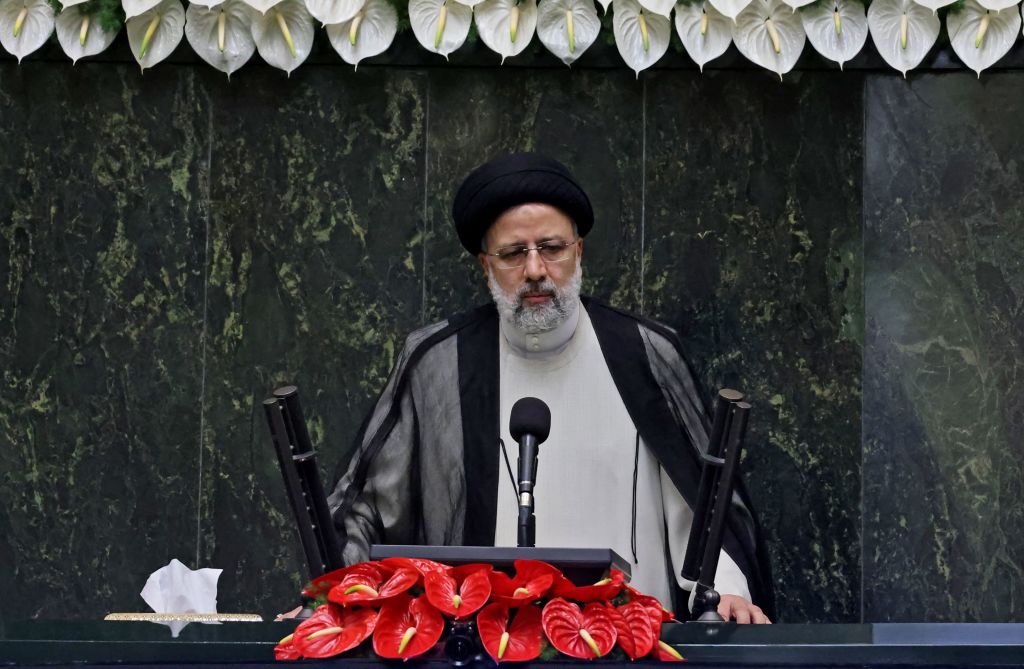It’s official: after eight years of a relatively pragmatic administration, Iran is now under new management. Ebrahim Raisi, a disciple of Supreme Leader Ayatollah Ali Khamenei and the former judiciary chief, was inaugurated this week as Iran’s next president.
Clad in a white shirt, black robe and thin-framed glasses, Raisi accepted a task that will likely prove to be his toughest assignment in a decades-long career serving the Islamic Republic system.
Protests over poor public services, like water shortages, are becoming more frequent. While the International Monetary Fund projects Iran’s economy to grow at 2.5 per cent this year, the country is in the midst of a highly fractious period. With a £140bn GDP, Iran’s total economic output is down 60 per cent over the last decade, a result of a stringent U.S. sanctions regime, gross mismanagement from successive Iranian governments and a banking system foreign investors find too risky to dabble in.
Raisi, understanding the Iranian population – not to mention the Islamic Republic’s core support base – is getting increasingly frustrated with the state of things. He has pledged to rejuvenate Iran’s economy – a task that could be virtually impossible if the ongoing nuclear negotiations with the United States don’t result in an successful outcome.
Nobody can be certain what Ebrahim Raisi’s foreign policy will look like
Already under U.S. sanctions for his role in sentencing thousands of Iranian dissidents to death in the late 1980s, Raisi is also starting his tenure with lacklustre public support. Indeed, this year’s presidential election had the poorest turnout in the Islamic Republic’s history, with only 48 per cent of the population choosing to vote for a winnowed field designed to make Raisi’s victory a fait-accompli. To the extent Raisi has any support in the system, it’s from Khamenei, the man at the top, who in his old age is trying to ensure a loyal servant is in position to replace him after his death.
For the West, the actual result of Iran’s presidential election is less important than what the result means for the ongoing nuclear talks in Geneva. Those negotiations, which seek to prod both Washington and Tehran back into compliance with the 2015 nuclear deal, are proving to be far more technically onerous than many previously thought.
Despite predictions of a relatively painless, straightforward return to the previous arrangement, it turns out that reversing Iran’s nuclear advances and lifting the torrent of U.S. sanctions imposed over the last four years isn’t as simple as flipping a switch to the pre-Donald Trump era.
Nearly five months since negotiations began, the two sides are still haggling over highly complicated details of a prospective agreement, including which U.S. sanctions will be lifted, what to do with the more advanced centrifuges Iranians engineers have manufactured in the interim, and how to tie the entire deal together so as to prevent future violations.
U.S. officials such as Secretary of State Antony Blinken are warning that Washington won’t allow the talks to go on forever. Depending on the negotiating team Raisi surrounds himself with, getting to a ‘yes’ could be pushed even further down the road. The Biden administration has already told the incoming Iranian administration that it can forget about additional U.S. concessions.
In essence then, the U.S. and Iran are staring each other in the eyes and waiting for the other to blink. During his inaugural speech, Raisi vowed that Iranians will not succumb to U.S. pressure tactics. The U.S., meanwhile, is vowing in equally strong terms that more stonewalling from Iranian officials won’t produce the sanctions relief they so desperately want (and need).
As important and all-consuming as the nuclear file is, stability in the Middle East is what the U.S. and the West crave most. While there is an assumption that stability in the Persian Gulf hinges on the nuclear talks, this is not necessarily the case.
In the grand scheme of things, the Middle East’s security situation is ultimately the responsibility of the states that live there. More amicable relations between the West and Iran are no doubt desirable, but they will only go so far if Iran and its neighbours remain at each other’s throats and undermine one another at every turn. This is why the discussions involving Iranian and Saudi officials that began in April are perhaps even more important than the nuclear negotiations.
As the Middle East’s two largest powers economically, militarily and spiritually, Iran and Saudi Arabia possess a unique responsibility in working toward a mechanism which would allow both to at least tolerate one another. Former U.S. president Barack Obama’s observation back in 2016 is still very much applicable today:
‘The competition between the Saudis and the Iranians…requires us to say to our friends as well as to the Iranians that they need to find an effective way to share the neighbourhood and institute some sort of cold peace.’
Nobody can be certain what Ebrahim Raisi’s foreign policy will look like, nor can we predict what crises or catastrophes may occur on his watch. But what can be said with clarity and conviction is that the costs of returning to an era of maximum pressure cloud out whatever benefits the U.S., Iran, and the region as a whole perceive.






Comments